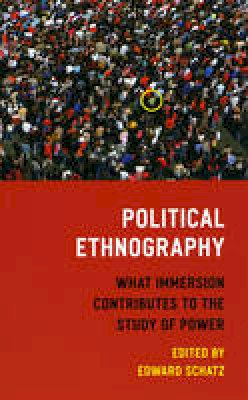
Stock image for illustration purposes only - book cover, edition or condition may vary.
Political Ethnography: What Immersion Contributes to the Study of Politics
Edward Schatz (Ed.)
€ 41.44
FREE Delivery in Ireland
Description for Political Ethnography: What Immersion Contributes to the Study of Politics
Paperback. Demonstrates that ethnography is uniquely suited for illuminating the study of politics. This book addresses the central ontological and epistemological issues raised by ethnographic work. It also grapples with the reality that all research is conducted from a first-person perspective. Editor(s): Schatz, Edward. Num Pages: 352 pages, 5 tables. BIC Classification: JPA. Category: (UP) Postgraduate, Research & Scholarly. Dimension: 229 x 156 x 23. Weight in Grams: 582.
Scholars of politics have sought in recent years to make the discipline more hospitable to qualitative methods of research. Lauding the results of this effort and highlighting its potential for the future, Political Ethnography makes a compelling case for one such method in particular. Ethnography, the contributors amply demonstrate in a wide range of original essays, is uniquely suited for illuminating the study of politics. Situating these pieces within the context of developments in political science, Edward Schatz provides an overarching introduction and substantive prefaces to each of the volume's four sections. The first of these parts addresses the central ontological and epistemological issues raised by ethnographic work, while the second grapples with the reality that all research is conducted from a first-person perspective. The third section goes on to explore how ethnographic research can provide fresh perspectives on such perennial topics as opinion, causality, and power. Concluding that political ethnography can and should play a central role in the field as a whole, the final chapters illuminate the many ways in which ethnographic approaches can enhance, improve, and, in some areas, transform the study of politics.
Product Details
Publisher
The University of Chicago Press
Number of pages
352
Format
Paperback
Publication date
2009
Condition
New
Number of Pages
352
Place of Publication
, United States
ISBN
9780226736778
SKU
V9780226736778
Shipping Time
Usually ships in 4 to 8 working days
Ref
99-1
About Edward Schatz (Ed.)
Edward Schatz is associate professor of political science at the University of Toronto.
Reviews for Political Ethnography: What Immersion Contributes to the Study of Politics
Until now, political scientists interested in ethnography have had to turn to texts in other fields for enlightenment. Finally illuminating the many ways in which ethnographic approaches can contribute to the study of politics, this book will occupy an important and distinctive place in political science. Extremely well written, it does an excellent job of providing concrete examples of successful ethnographic research and, at the same time, linking methodology to fundamental philoslophical ideas about the way the world works.
Gregory Kasza, Indiana University
Gregory Kasza, Indiana University+ How did we get a political science that methodologically assumed its ordinary human subjects had no insights into the operation of power? Here, happily, are diverse, sustained arguments and practical demonstrations of the value of a social science not conducted entirely behind people's backs. Political Ethnography is both inspiring and instructive.
James C. Scott, Yale University
James C. Scott, Yale University How did we get a political science that methodologically assumed its ordinary human subjects had no insights into the operation of power? Here, happily, are diverse, sustained arguments and practical demonstrations of the value of a social science not conducted entirely behind people s backs. Political Ethnography is both inspiring and instructive. James C. Scott, Yale University
James C. Scott, Yale University How did we get a political science that methodologically assumed its ordinary human subjects had no insights into the operation of power? Here, happily, are diverse, sustained arguments and practical demonstrations of the value of a social science not conducted entirely behind people's backs. Political Ethnography is both inspiring and instructive.
James C. Scott, Yale University
James C. Scott, Yale University
Gregory Kasza, Indiana University
Gregory Kasza, Indiana University+ How did we get a political science that methodologically assumed its ordinary human subjects had no insights into the operation of power? Here, happily, are diverse, sustained arguments and practical demonstrations of the value of a social science not conducted entirely behind people's backs. Political Ethnography is both inspiring and instructive.
James C. Scott, Yale University
James C. Scott, Yale University How did we get a political science that methodologically assumed its ordinary human subjects had no insights into the operation of power? Here, happily, are diverse, sustained arguments and practical demonstrations of the value of a social science not conducted entirely behind people s backs. Political Ethnography is both inspiring and instructive. James C. Scott, Yale University
James C. Scott, Yale University How did we get a political science that methodologically assumed its ordinary human subjects had no insights into the operation of power? Here, happily, are diverse, sustained arguments and practical demonstrations of the value of a social science not conducted entirely behind people's backs. Political Ethnography is both inspiring and instructive.
James C. Scott, Yale University
James C. Scott, Yale University
